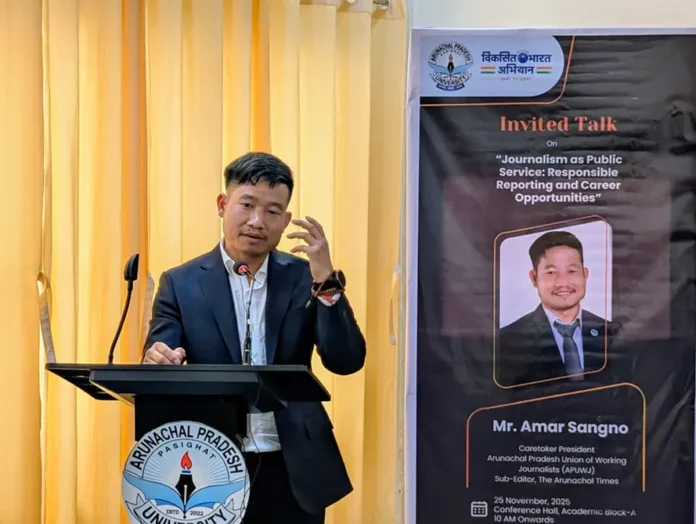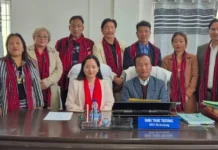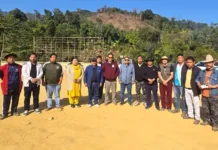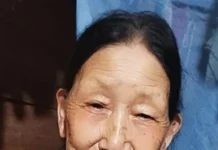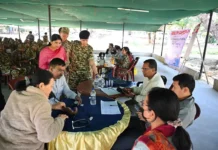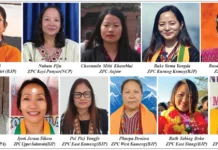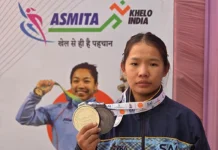PASIGHAT, 26 Nov: “Repeat a lie often enough, and it starts sounding like the truth – the illusion of truth. But journalism must rise above that. It must serve the public, not become the mouthpiece of any authority or interest group,” said senior journalist Amar Sangno, addressing students during an invited talk on “Journalism as Public Service: Responsible Reporting and Career Opportunities” at Arunachal Pradesh State University (APU) here on Tuesday.
He cautioned that in an age where “anyone with a lapel mic and a smartphone claims to be a journalist,” the core duty of the profession remains unchanged: to present credible, verified information to the public.
Sangno, who is currently the caretaker president of the Arunachal Pradesh Union of Working Journalists (APUWJ) and chief reporter at The Arunachal Times, spoke extensively on media ethics, misinformation, and the evolution of journalism in Arunachal Pradesh.
He congratulated APSU for establishing the Mass Communication department, calling it “a timely step that will strengthen the state’s media ecosystem.”
APU vice chancellor prof. Tomo Riba, in his address, highlighted the indispensable role of responsible journalism in a democratic society. He said the media must function as “a mirror that reflects truth, not a tool that amplifies distortion.”
Emphasising the importance of media literacy, he urged students and faculty alike to remain informed, discerning, and critically aware of the information they consume.
Praising the new department, he expressed hope that it would “grow into a robust academic unit and contribute significantly to the media landscape of Arunachal Pradesh in the years to come.”
Registrar Narmi Darang underscored the importance of ethical conduct in journalism, urging students to uphold accuracy, fairness, and accountability. He noted that the rapid expansion of digital media has made responsible reporting more crucial than ever.
During the technical session, Sangno shared insights from his years of experience, discussing newsroom challenges, the rise of digital platforms, and the future of journalism in the state.
He encouraged students to cultivate curiosity, courage, and compassion-qualities he described as essential for meaningful journalism.
He also clarified that mass communication offers diverse career paths beyond reporting, including public relations, digital content creation, advertising, and research.
Students engaged actively during the interactive segment, asking questions on yellow journalism, gatekeeping, ethics, and career prospects. Sangno responded with practical examples and urged them to “be part of the solution, not the noise.”
Assistant professor, Mass Comm Dept, Dr. Kombong Darang said the session had broadened students’ understanding of the media profession and reaffirmed the department’s commitment to nurturing informed communicators.
Earlier, head (in charge) of the department Dr. Prem Taba said that beginning the department’s academic journey with experienced professionals was intentional. “Our department is young, recently established, and steadily taking shape within the academic framework of APU. I wanted our students to learn from seasoned practitioners like Sangno, whose years of experience offer lessons no textbook can fully capture,” he said.
The programme was attended by the Dean of Academic Affairs, prof. P.C. Jena, heads of various departments, faculty members, assistant registrars, and students from multiple departments. (Compiled by APU, MA Mass Communication, 1st Semester Students)

